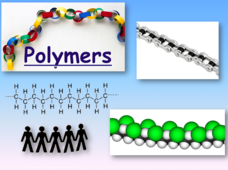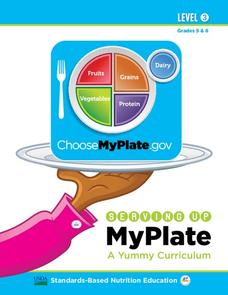Science Geek
Basic Biochemistry - Carbohydrate, Protein and Fat
You are what you eat, right down to your molecular structure. A hearty presentation begins with the two types of carbohydrates, simple and complex. Then it details proteins and amino acids. It ends by reviewing the three types of fats,...
Science Geek
Polymers
A pirate's favorite amino acid is Arrrrginine! Presentation begins with the difference between a monomer and a polymer. Then it applies that to carbohydrates and proteins and ends with DNA and plastics. Presentation is the last in a...
Biology Junction
Macromolecules
In chemistry, organic means something contains a carbon base. A helpful presentation starts by defining macromolecules as large organic carbon molecules. Scholars answer questions about each topic on the associated worksheet. It covers...
Primary Resources
Eating a Balanced Diet
A perky presentation provides an overview of what comprises a balanced diet. Viewers discover why water is vital to our health, what the macro-nutrients are and what they provide, and how calcium is important to bones and teeth. The...
Science 4 Inquiry
The Last Supper: Identifying Macromolecules
Why do medical examiners always state the contents of a person's stomach? Scholars learn about the importance of macromolecules through a case study of stomach contents. They perform multiple tests to determine a conclusion before they...
Mascil Project
Molecular Gastronomy - Science in the Kitchen
Some say cooking is an art—and a science! Scholars scope out the savory subject of molecular gastronomy with a series of related activities. The teacher's guide contains printable worksheets and helpful tips for implementing the lesson.
Science & Plants for Schools
Photosynthesis - A Survival Guide
Young scientists learn what it takes for life on Earth to survive with this series of photosynthesis resources. Offering twelve different activities ranging from independent practice worksheets to in depth scientific experiments, this...
US Department of Agriculture
Serving Up My Plate
Within three nutrition-themed, inquiry-based learning opportunities, pupils take notice of their eating habits; delve deep into the five food groups, gain experience in planning meals, participate in a taste test, and explore ads from...
Nemours KidsHealth
Healthy Snacking: Grades 9-12
Snacks—even the word can conger up a hunger. Rapidly growing teens, especially, rely on snacks to get them from one meal to the next. After reading a series of articles about nutrition and healthy snack choices, pupils fill out a report...
Nemours KidsHealth
Food Labels: Grades 6-8
With the help of two activities, scholars discover what's in their favorite foods by reading nutrition labels. Activity one challenges participants to write a letter to a fictional peer about the importance of making healthy choices....
American Heart Association
Meet the Calorie
What is a calorie and how does it work? How many calories do we consume in a typical day, and how many do our cells need to function well? Your learners will answer these questions and more using a worksheet, which includes informational...
TED-Ed
Sugar: Hiding in Plain Sight
Did you know that you can find added sugars in three-quarters of the foods you find in grocery stores? Invite your learners to consider how much sugar exists in the food products we eat on a day-to-day basis, as well as to learn about...
Nemours KidsHealth
Food Labels: Grades 3-5
Bring awareness to the ingredients scholars ingest daily with two lessons that look deeply into food labels. The first instructional activity explores the difference between processed and fresh foods while the second instructional...
Other popular searches
- Protein Carbohydrates Fats
- Complex Carbohydrates
- Biochemistry Carbohydrates
- Carbohydrates Fats Proteins
- Carbohydrates and Proteins
- Carbohydrates Proteins
- Carbohydrates and Lipids
- Nutrition Carbohydrates
- Carbohydrates in Foods
- Carbohydrates and Cereal
- Nutrition and Carbohydrates
- Carbohydrates Structures














